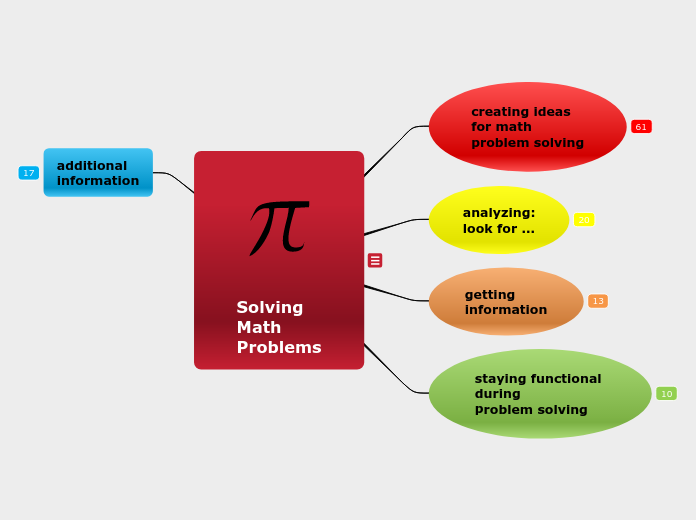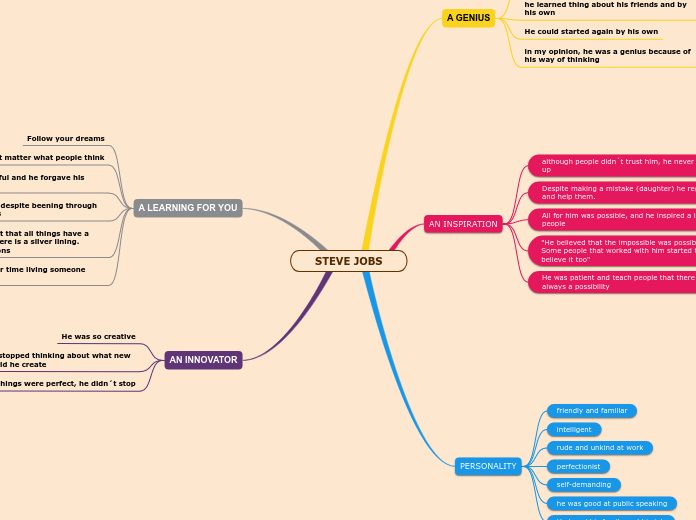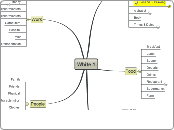Since pleasure in beauty is subjective and depends on one's experience, the idea of beautiful life differs in each and every individual.
Creativity is a positive thing in our life and plays a part in our lives.
Since the idea of 'beautiful' occurs when one gets a feeling of satisfaction, happiness and/or enjoyment, Chaos can be considered beautiful. It is because there are definitely some people who enjoyed doing something chaotic, for example, terrorism or warring.
Since Art is also about expression, it can also be used as a means to portray pleasure.
Since Art is a form of expression, it can serve as a therapy to some people. It also helps one to be creative. Therefore, anything can be art. Skills/techniques are not always necessary. Art as Representation is in a way, a form of expression since it can be a portrayal of someone or something. Since it all comes down to expressing, one can express Chaos in Art.
Step 5: Therefore, since Art is a form of expression that can be a representation of something or someone and does not necessarily require skills/techniques, it can be used to express chaos, beauty or beautiful life. As the idea of pleasure in beauty is subjective and is based on one's experience, chaos can be considered beauty and can also be used to creatively express it in Art since creativity makes a significant contribution to our lives. Therefore, we agree with the quote to a large extent.
Step 1 (Purpose): To determine how far we agree with the quote.
Step 2: (Major Question) What is the relationship between Art, Chaos and the idea of a beautiful life?
What is life?
What is 'beautiful' life?
What is 'beautiful'?
Pleasing the senses or mind aesthetically.
Must a beautiful life have things that pleases the
senses or mind aesthetically?
- No. Since the term 'beautiful life' differs from
one person to another, sometimes things that may
not be pleasing the senses or the mind can be beautiful.
= Some people thinks that having money makes you happy so it is a beautiful life.
= Some people thinks that having money may not make you happy so having money does not result in beautiful life.
Millionaires by The Script
- These young people spend a lot of their time in the streets, stealing food from shops because they do not own any money, yet they see themselves as millionaires because what they are lack of does not make them brood.
Beautiful Life by Union J
- Encourages people to live life to the fullest - including one insecure girl who lives a 'broken dream' and spades on the make-up 'to cover up an empty space' - feels a touch on the dated side
Positive vibes, lively, Great achievements; winning end
The existence of living things or just something being created.
(in art) the depiction of a subject from a real model, rather than from an artist's imagination.
Life is Art Foundation
Everyday life in art, Dimitri Ermakov
Step 3A: What is beauty?
Should art be beautiful?
Philosophers call the reaction to an appealing quality an aesthetic response.
Aesthetic response varies from an individual to another. (Aesthetic response is subjective.)
Beauty in art lies in the eyes of the beholder. Every individual have their own set of criteria to decide whether an art is beautiful. Therefore, the idea of beautiful is subjective as it is based on an individual's certain set of criteria.
What defines beautiful?
Beauty: gives intense pleasure or deep satisfaction to the mind or a meaningful design or pattern.
What is pleasure?
The experience of pleasure is subjective. Therefore, the pleasure one has while doing Art is subjective and depends on his/her experience.
a feeling of happy satisfaction and enjoyment
What is satisfaction?
*what does it mean to be satisfied?
Meeting the expectations, needs, or desires of (someone).
Pleased because you have got what you wanted, or because something has happened in the way that you wanted
Step 3A: What is Chaos?
Is chaos Art?
Can chaos be caused by Art?
Yes, it can lead to suing, riot, arrest.
E.g. Pussy Riot is a Russian feminist punk rock protest group
based in Moscow that stages unauthorised provocative guerrilla performances in unusual public locations, which are edited into music videos and posted on the Internet. The collective's lyrical themes include feminism, LGBT rights, and opposition to Russian President Vladimir Putin, whom the group considers a dictator, and to his links with the leadership of the Russian Orthodox Church.
directed at the Orthodox Church leader's support for Putin during his election campaign. The head of the Russian Orthodox Church, Patriarch Kirill I, said the performers were doing the work of the devil.
The action was supposed to be concerned with the prisoners in the Bolotnaya Square case, corrupt Olympic officials, the plight of the arrested environmentalist Yevgeny Vitishko (ru) and suppressed freedoms in Russia.
What causes chaos?
Natural disasters
a natural event such as a flood, earthquake, or hurricane that causes great damage or loss of life.
-Earthquake
-Floods
-Drought
-Tsunami
-Hurricane
-Volcano
-Landslide
-Extreme weather
Example: 1931 China Flood.
It was the deadliest natural disaster causing millions of life lost and causing chaos in China.
Conflicts
Social
Struggle for power over different interests.
International Conflict
It occurs when two states or more are in conflicts and this brings about war. It causes economic destruction, social disruption through extreme violence.
E.g. War in Iraq, Afghanistan, etc.
Personal Issues
What are personal conflicts?
Personal conflict takes many forms, some more serious than others. It stems from the long-term choices you make and decisions that you have to make in an instant. Knowing your character and integrity determines how you solve your conflict.
Miscommunication in a group
Relationship problems
- Breakups
- Divorce
- Disown
- Estranged
Political Issues
Riots
What are riots?
a noisy, violent public disorder caused by a group or crowd of persons, as by a crowd protesting against another group, a government policy, etc., in the streets.
Example: 1964 Race riots
2 riots happened in the same year causing conflict between the Muslim and Chinese and leading to many deaths.
Definition: Disorder, confusion, disarrangement
E.g.: Antonin Artaud's Theatre of Cruelty
About Theatre of Cruelty
His definition of cruelty: Waking up the senses of the audience through
the nerves and the heart. Something that creates an impact on the audience.
His theater of cruelty creates confusion and makes the audience feels uncomfortable through the use of loud, piercing sounds and flashing lights.
Step 3A: What is Art?
Art is based on one’s imagination and creativity.
Why should one express their creativity?
Why is creativity important?
- growth development
- confidence
- problem-solving
- thinkers
- ability to "think outside of the box" can help to lead the future and make special things happen.
- Express their feelings and emotions.
- "All movements start with some expression of art because the only way you can truly express what you feel is through being creative and making other people understand exactly what you are feeling."
What is creativity?
“Creativity is the process of bringing something new into being. Creativity requires passion and commitment. It brings to our awareness what was previously hidden and points to new life. The experience is one of heightened consciousness: ecstasy.”
For example, there is this company that transforms kids' doodles into real life toys.
From Art History module:
• Art as Something Beautiful
• Art as Imitation (of Life)
• Art as Representation
• Art as Expression
• Art as Technique/Skill
• Anything can be art.
Can anything be art?
Based on team response,
We think that they should be a set of criteria
to determine whether that object or artwork can be considered as art.
1. The Art should evoke certain emotions in the audience. (Example: Fear, sadness, happiness.)
2. The Art should have a purpose or convey a certain message to the audience.
Does Art require technique/skill?
Art can be done using different types of art of techniques.
Chuck Close: Big Self-Portrait
- Various complicated techniques were used to achieve
the desired outcome.
- In this format the image becomes a mosaic of black, gray, and white visual information that the artist replicates by spraying a mixture of black acrylic paint and water onto the canvas with an airbrush. Specific features like the illusion of light reflecting off the hairs of his beard were achieved by scratching paint from the surface of the canvas with a razor blade.
- Painting
- Drawing
- Photography
- Sculpting
- Acting
- Writing
- Fashion
- Printmaking
- Dance
- Music
Is Art a form of expression?
Expressionism
Why is Art used as a platform for expression?
Words are never enough to express one's emotions, feelings or thoughts.
Hence, people resort to other means to express themselves.
They express themselves through different form of art.
- Literature, songs, theater, paintings etc.
Art Therapy
Art therapy is used to help people manage physical and emotional problems by using creative activities to express emotions. It provides a way for people to come to terms with emotional conflicts, increase self-awareness, and express unspoken and often unconscious concerns about their illness and their lives.
According to practitioners, called art therapists, it helps people express hidden emotions; reduces stress, fear, and anxiety; and provides a sense of freedom.
What is Expressionism?
- a modernist movement, initially in poetry and painting
- Its typical trait is to present the world solely from a subjective perspective, distorting it radically for emotional effect in order to evoke moods or ideas.
- Expressionist artists sought to express meaning or emotional experience rather than physical reality.
Literature
Music
Theodor Adorno describes expressionism as concerned with the unconscious, and states that "the depiction of fear lies at the centre" of expressionist music, with dissonance predominating, so that the "harmonious, affirmative element of art is banished" (Adorno 2009, 275–76).
One may describe the expressionist painting technique as the distortion of reality (mostly colors and shapes) to create a nightmarish effect for the particular painting as a whole. Expressionist music roughly does the same thing, where the dramatically increased dissonance creates, aurally, a nightmarish atmosphere.
Alban Berg: Opera Wozzeck
Drama
Expressionist plays often dramatise the spiritual awakening and sufferings of their protagonists. Some utilise an episodic dramatic structure and are known as Stationendramen (station plays), modeled on the presentation of the suffering and death of Jesus in the Stations of the Cross. August Strindberg had pioneered this form with his autobiographical trilogy To Damascus. Theses plays also often dramatise the struggle against bourgeois values and established authority, frequently personified by the Father. In Sorge's The Beggar, (Der Bettler), for example, the young hero's mentally ill father raves about the prospect of mining the riches of Mars and is finally poisoned by his son. In Bronnen's Parricide (Vatermord), the son stabs his tyrannical father to death, only to have to fend off the frenzied sexual overtures of his mother.
In Expressionist drama, the speech is either expansive and rhapsodic, or clipped and telegraphic.
Journals
German Expressionism, Der Sturm (1919-1932) by Herwarth Walden
Architecture
Characteristics:
1. Distortion of form for an emotional effect.
2. Subordination of realism to symbolic or stylistic expression of inner experience.
3. An underlying effort at achieving the new, original, and visionary.
4. Profusion of works on paper, and models, with discovery and representations of concepts more important than pragmatic finished products.
5. Often hybrid solutions, irreducible to a single concept.
6. Themes of natural romantic phenomena, such as caves, mountains, lightning, crystal and rock formations. As such it is more mineral and elemental than florid and organic which characterized its close contemporary art nouveau.
7. Utilises creative potential of artisan craftsmanship.
8. Tendency more towards the gothic than the classical. Expressionist architecture also tends more towards the romanesque and the rococo than the classical.
9. Though a movement in Europe, expressionism is as eastern as western. It draws as much from Moorish, Islamic, Egyptian, and Indian art and architecture as from Roman or Greek.
10. Conception of architecture as a work of art.
- Experiences from WWI + political turmoil & social upheaval that followed the German Revolution of 1919, resulted in a utopian outlook and a romantic socialist agenda.
- Economic conditions severely limited the number of built commissions between 1914 and the mid-1920s, resulting in many of the most important expressionist works remaining as projects on paper, such as Bruno Taut's Alpine Architecture and Hermann Finsterlin's Formspiels.
Short-lived exhibition buildings were numerous and highly significant during this period. Scenography for theatre and films provided another outlet for the expressionist imagination,[4] and provided supplemental incomes for designers attempting to challenge conventions in a harsh economic climate.
Casa di vetro (Glass house), 1924
Sculpture
Ernst Barlach, Eric Heckel (painter)
Mary Wigman, Hexentanz
Her moves are provocatively terrifying and are on point, quite sharp. This is a form of expression.
Dance
What is expression?
the action of making known one's thoughts or feelings.
What are feelings?
The emotional side of someone's character; emotional responses or tendencies to respond.
What are thoughts?
An idea or opinion produced by thinking, or occurring suddenly in the mind.
Does Art serve as a representation?
What is representation?
A representation is a type of recording in which the sensory information about a physical object is described in a medium. The degree to which an artistic representation resembles the object it represents is a function of resolution and does not bear on the denotation of the word. For example, both the Mona Lisa and a child's crayon drawing of Lisa del Giocondo would be considered representational, and any preference for one over the other would need to be understood as a matter of aesthetics.
Mona Lisa
- to bring to mind by description
- to symbolize
- to be the embodiment of
the description or portrayal of someone or something in a particular way.









